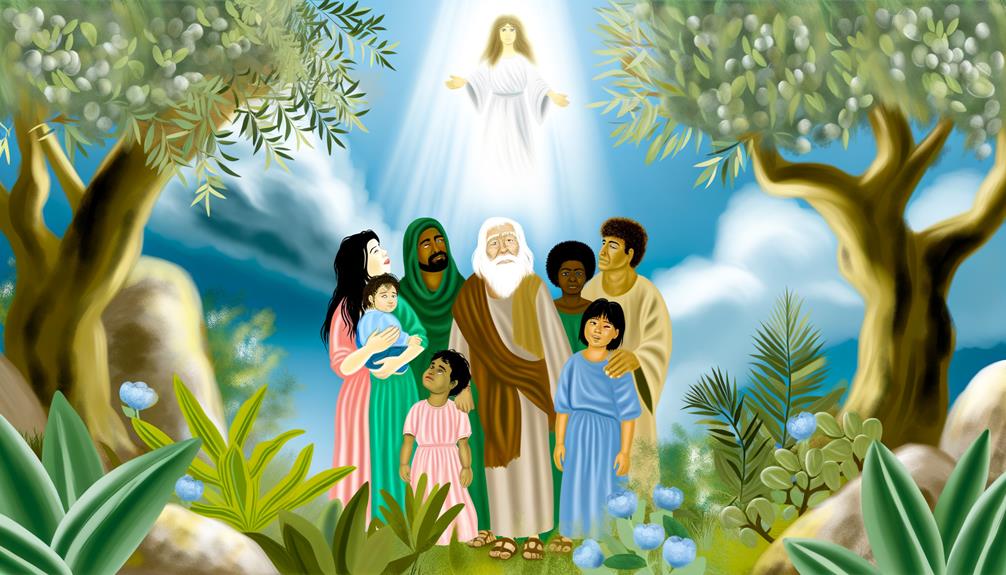Divine Grace Meaning in Bible: Favor and Compassion
Divine grace in the Bible refers to the unmerited favor and benevolence from God towards humanity, serving as a cornerstone of salvation and spiritual renewal. It is a gratuitous gift that reaches its fullest expression in the life, death, and resurrection of Jesus Christ, as emphasized in the Pauline epistles which underscore that salvation is achieved through faith and not works.
This transformative force is evident from the Old Covenant through covenants with figures like Abraham, to the New Covenant, where grace manifests through Jesus’ ministry and parables like the Prodigal Son, highlighting its extensive role in the believer’s spiritual journey and daily life. Further exploration reveals deeper nuances of this foundational theological concept.

Divine Grace Meaning in the Bible: Unmerited Favor, Empowerment, and Salvation
| Aspect | Biblical Meaning |
|---|---|
| Unmerited Favor & Love | Divine grace refers to God’s unmerited favor and love, given freely to humanity despite their flaws and shortcomings. It is a gift that cannot be earned but is generously offered by God (Ephesians 2:8-9). |
| Forgiveness & Mercy | Grace is closely tied to God’s forgiveness and mercy. Through divine grace, God forgives sins, showing compassion and mercy even when humans fail to live up to His standards (Romans 3:24). |
| Empowerment & Strength | Divine grace is not just about forgiveness; it also empowers believers to live righteous and godly lives. It provides strength to overcome challenges and live according to God’s will (2 Corinthians 12:9). |
| Salvation & Eternal Life | Grace is the foundation of salvation. It is through divine grace that salvation is made available, leading to eternal life. This grace is expressed through the sacrifice of Jesus Christ (Titus 2:11, John 1:17). |
| Transformation & Renewal | Divine grace brings transformation and renewal, enabling believers to grow spiritually. It signifies a new beginning, guiding individuals to live a life that reflects God’s character (2 Corinthians 5:17). |
Definition of Divine Grace

In biblical theology, divine grace is often defined as the unmerited favor and benevolence bestowed by God upon humanity.
This concept underscores the fundamental nature of grace as a gratuitous gift, not earned by human effort or merit. It is an expression of God’s unconditional love and mercy, manifesting in various forms such as forgiveness, redemption, and sanctification.
Theologically, divine grace is pivotal in understanding the relationship between God and humankind, serving as the cornerstone of salvation and spiritual transformation.
This grace is seen as both a transformative power that enables believers to live in accordance with God’s will and a sustaining force that supports them through life’s trials, emphasizing its pervasive and enduring impact.
Grace in the Old Testament

In the Old Scriptures, the concept of divine grace is exemplified through the narrative of Noah, where God’s favor is bestowed upon him amidst a corrupt world, signifying an early manifestation of grace.
Additionally, the Covenant of Grace established with Abraham and his descendants underscores a continuing theme of unmerited favor, promising blessings and a lasting relationship with God despite human fallibility.
These instances collectively illustrate the foundational role of grace in the theological framework of the Old Scriptures.
Noah and Divine Favor
How does the narrative of Noah exemplify the concept of divine favor as articulated in the Old Scriptures?
In the Book of Genesis, Noah is depicted as a righteous man in a corrupt world, finding favor in the eyes of the Lord (Genesis 6:8).
This divine favor, or grace, is evidenced by God’s decision to spare Noah and his family from the impending deluge.
The text underscores Noah’s obedience and blamelessness, qualities that merit God’s protective grace.
Divine favor in this situation is not arbitrary but is granted in response to Noah’s piety and moral integrity.
Consequently, Noah’s story illustrates the reciprocal relationship between human righteousness and divine grace in the Old Covenant narrative.
Covenant of Grace
Exploring the concept of the Covenant of Grace within the Old Scriptures reveals a profound theological framework where divine favor is extended to humanity through various covenants, starting with the Abrahamic Covenant.
This covenant is foundational in understanding how God’s grace operates through promises and commitments that transcend human merit. The Abrahamic Covenant, detailed in Genesis, illustrates God’s unilateral promise to Abraham, ensuring the blessing of his descendants and the eventual coming of the Messiah.
This divine commitment represents grace, as it is unearned and underscores God’s initiative in the redemption narrative. Subsequent covenants, such as those with Moses and David, build upon this foundation, further elucidating the continuity of divine grace in the unfolding story of salvation history.
Grace in the New Testament

The concept of grace in the New scriptures is intricately woven into the fabric of Christian theology, representing an unmerited divine favor bestowed upon humanity through the life, death, and resurrection of Jesus Christ. This grace, often termed ‘charis’ in Greek, signifies God’s benevolence that transcends human merit or effort.
The Pauline epistles, especially in Ephesians 2:8-9, emphasize grace as the cornerstone of salvation, not by works but through faith. Additionally, the Gospels illustrate Jesus’ ministry as an embodiment of divine grace, healing and forgiving sins without prerequisite.
Theologically, grace underscores the New Covenant’s message of redemption and reconciliation, marking a profound departure from the retributive justice of Old Covenant law to a paradigm of unconditional divine benevolence.
Stories of Redemption

Biblical narratives, such as the parables of the Prodigal Son and the Lost Sheep, serve as profound illustrations of redemption, highlighting the transformative power of divine grace in restoring individuals to a state of spiritual wholeness.
In these stories, the act of returning or being found symbolizes the sinner’s acknowledgment of their fallibility and the subsequent acceptance of grace.
The Prodigal Son’s return to his father, who runs to embrace him, signifies unconditional acceptance and the restoration of familial bonds.
Similarly, the shepherd’s relentless search for the lost sheep underscores the value of each individual soul.
These parables underscore that divine grace is not merely a passive offering but an active, pursuing force that seeks to reclaim and renew.
Forgiveness Through Grace

Forgiveness through grace forms the cornerstone of many biblical teachings, as it not only restores relationships but also exemplifies the boundless mercy that characterizes divine intervention.
Biblically, grace is often portrayed as the unmerited favor of God, enabling forgiveness where justice demands retribution. This concept is illustrated in passages such as Ephesians 2:8-9, where salvation is described as a gift granted through faith, not by works.
The parable of the Prodigal Son (Luke 15:11-32) further elucidates this theme, depicting a father’s unconditional forgiveness towards a repentant son, symbolizing God’s readiness to forgive repentant sinners.
Such narratives underscore that divine grace is instrumental in reconciling humanity with God, fostering a profound understanding of mercy and compassion.
Jesus Christ and Grace

Central to the New Covenant narrative, Jesus Christ embodies divine grace through his teachings, actions, and ultimate sacrifice, offering a profound illustration of unmerited favor and redemption.
His life and ministry reveal the multifaceted nature of grace:
- Incarnation: The very act of God becoming human in Jesus signifies an unparalleled act of grace.
- Teachings: Jesus’ parables, such as the Prodigal Son, underscore themes of forgiveness and unconditional love.
- Miracles: Acts of healing and compassion highlight grace extended to the marginalized and suffering.
Analyzing these aspects allows for a deeper comprehension of grace as an integral element of Jesus’ mission.
Grace in Paul’s Letters

How does the Apostle Paul articulate the concept of divine grace in his epistles, emphasizing its transformative power and foundational role in the life of believers?
Paul’s letters provide a robust theological framework for understanding grace, characterizing it as an unmerited favor bestowed by God through Christ (Ephesians 2:8-9).
He underscores grace as a pivotal component in salvation, affirming that believers are justified by faith, not by works (Romans 3:24).
Additionally, Paul presents grace as a sustaining force in the Christian journey, enabling believers to endure and flourish despite trials (2 Corinthians 12:9).
His epistles consistently highlight grace as a divine gift that redefines human existence, anchoring it in God’s redemptive plan.
Transformative Power of Grace

Building upon Paul’s theological exposition of divine grace, the transformative power of grace manifests in the profound renewal of the believer’s identity and conduct. This divine intervention initiates a metamorphosis that aligns the individual’s will with God’s purpose, effecting a holistic change.
Key aspects of this transformation include:
- Regeneration: A spiritual rebirth that redefines the believer’s nature.
- Sanctification: The ongoing process of being made holy, reflecting God’s character.
- Empowerment: Enabling believers to overcome sin and live righteously.
These elements collectively illustrate how grace not only redeems but also continually reforms, ensuring that the believer’s life is a demonstration of divine influence.
Grace in Daily Life

In the practical domain of daily life, divine grace serves as a sustaining force, guiding believers through ordinary and extraordinary challenges with a sense of purpose and resilience.
This grace manifests in various ways, such as providing inner strength during times of adversity or fostering a spirit of compassion and forgiveness in interpersonal relationships.
It underpins moral decision-making, enabling individuals to act justly and ethically despite complex circumstances.
In addition, divine grace encourages self-reflection and personal growth, promoting a deeper connection with one’s faith and community.
By recognizing and embracing grace, believers find solace and motivation, enhancing their capacity to navigate life’s multifaceted demands with humility and gratitude. The serenity prayer, with its call to accept the things we cannot change, courage to change the things we can, and wisdom to know the difference, captures the essence of grace in action. Through grace, believers are able to cultivate a spirit of resilience and inner peace, finding strength in surrendering their struggles to a higher power. This sense of surrender allows them to release the burden of control and find freedom in trusting the process of life.
As a result, grace becomes integral to a well-lived, spiritually enriched life.
Grace and Salvation

The concept of grace in relation to salvation encompasses the notion of unmerited divine favor, wherein God’s benevolence grants redemption irrespective of human merit.
This theological perspective underscores the role of faith as a conduit for receiving this grace, ultimately leading to the promise of eternal life.
Unmerited Divine Favor
Grace, as depicted in the Bible, refers to the unearned and unconditional favor bestowed by God upon humanity, particularly in the context of salvation. This divine grace is foundational to Christian theology, emphasizing that it is not merited by human actions but is a gift from God.
The concept of unmerited favor underscores several critical aspects:
- Salvific Act: Grace is central to the process of salvation, illustrating God’s initiative in rescuing humanity.
- Unconditional Love: It demonstrates God’s unwavering love, independent of human worthiness.
- Transformative Power: Grace has the capacity to change lives, leading individuals towards spiritual growth.
This theological construct highlights the depth of divine generosity.
Faith and Redemption
Understanding the interplay between faith and redemption illuminates how divine grace operates within the framework of salvation.
In biblical theology, faith is not merely intellectual assent but a profound trust in God’s promises, exemplified through the life and sacrifice of Jesus Christ. Redemption, on the other hand, refers to the liberation from sin and its consequences, achieved through Christ’s atoning death.
Divine grace acts as the catalyst, facilitating this redemptive process. Ephesians 2:8-9 articulates this synergy: ‘For by grace you have been saved through faith,’ emphasizing that salvation is a divine gift, not earned by human effort.
Consequently, faith becomes the conduit through which grace is received, leading to redemption and ultimately, salvation.
Eternal Life Promise
Endowed by divine grace, the promise of eternal life encapsulates the ultimate fulfillment of salvation in biblical doctrine. This promise is not merely a future hope but an integral aspect of Christian faith, woven throughout Scripture. The New Covenant elucidates this concept, emphasizing its foundational role in the believer’s journey.
Scriptural Assurance: Passages like John 3:16 affirm eternal life through belief in Christ.
Grace as the Mechanism: Ephesians 2:8-9 underscores that salvation is a gift of grace, not by works.
Resurrection: 1 Corinthians 15:20-22 links eternal life to the resurrection of Jesus.
Transformative Nature: Romans 6:23 contrasts the wages of sin with the gift of God—eternal life.
This thorough biblical framework offers profound insights into the divine promise of eternal life.
Conclusion
The exploration of divine grace traverses the intricate tapestry of biblical narratives, spanning from the Old Scripture’s foundational covenants to the New Scripture’s redemptive promises.
Through the apostolic teachings, particularly those of Paul, grace emerges as a transformative force, pivotal for salvation and daily living.
But what deeper mysteries lie within this boundless gift?
The profound implications of divine grace beckon further scholarly inquiry, inviting a deeper understanding of its eternal significance and transformative potential.






